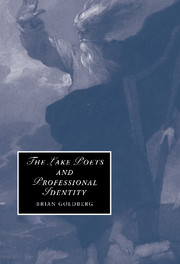Book contents
- Frontmatter
- Contents
- Acknowledgments
- Introduction: Professionalism and the Lake School of Poetry
- Part I Romanticism, risk, and professionalism
- Part II Genealogies of the romantic wanderer
- Part III Romantic itinerants
- Part IV The Lake school, professionalism, and the public
- 6 Robert Southey and the claims of literature
- 7 “Ministry more palpable”: William Wordsworth's romantic professionalism
- Notes
- Bibliography
- Index
7 - “Ministry more palpable”: William Wordsworth's romantic professionalism
Published online by Cambridge University Press: 14 January 2010
- Frontmatter
- Contents
- Acknowledgments
- Introduction: Professionalism and the Lake School of Poetry
- Part I Romanticism, risk, and professionalism
- Part II Genealogies of the romantic wanderer
- Part III Romantic itinerants
- Part IV The Lake school, professionalism, and the public
- 6 Robert Southey and the claims of literature
- 7 “Ministry more palpable”: William Wordsworth's romantic professionalism
- Notes
- Bibliography
- Index
Summary
Despite moments of high argument which insist that the inspired poet transcends normal economic and cultural arrangements, Wordsworth's vocational theorizing, publicly articulated in the Preface to Lyrical Ballads, aligns the poet with the new model of professionalism described in the introductory section of this book. In this chapter, I will first reconsider the vocational trajectory that leads Wordsworth to the full-time pursuit of poetry and also underwrites his insistence that poetry be treated as new, progressive professional labor. Aware of the growing possibilities of specialization, Wordsworth is also aware of its potential burdens, and he finds it necessary to describe a course of training that is particular to the poet while also being natural and spontaneous. In turn, this democratic ethic poses difficulty for the specificity of poetic practice that Wordsworth also wants to maintain. In the Preface, he makes his strongest statement about the special identity of the poet, an identity that he bases on the relationship between the poet and his informed but lay “client” audience. In the end, he cannot propose a new professionalism without taking into account the perseverance of traditional, landed values, and so he attempts to figure professional expertise in terms that will allow it to serve the same authorizing and status-generating function as landed property.
In 1805, retrospectively considering the attractions of the French Revolution, Wordsworth remarks that chief among these was the resemblance of certain revolutionary ideals to the dominant criteria of social advancement that he remembered from his own childhood:
It was my fortune scarcely to have seen
Through the whole tenor of my schoolday time
The face of one, who, whether boy or man,
Was vested with attention or respect
Through claims of wealth or blood.
- Type
- Chapter
- Information
- The Lake Poets and Professional Identity , pp. 215 - 231Publisher: Cambridge University PressPrint publication year: 2007



